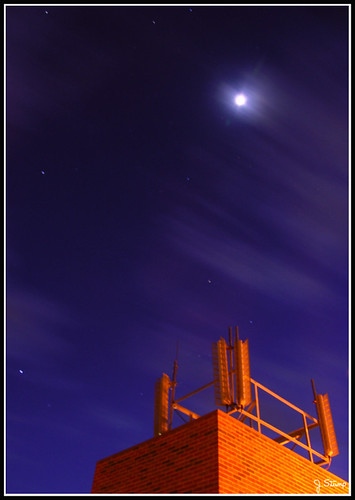.flickr-photo { border: solid 2px #000000; }
.flickr-yourcomment { }
.flickr-frame { text-align: left; padding: 3px; }
.flickr-caption { font-size: 0.8em; margin-top: 0px; }
I can’t believe I’ve yet to blog about Radio Lab, a radio show from WNYC that has immeasurably enriched my commuting and late-night dogwalking experience over the past month or so.
Ostensibly, Radio Lab is a “science show” but it covers such a wide range of phenomena (from behaviour, to physiology, to time and space) and addresses these topics with such wit and technical mastery that the categorization seems inadequate somehow. Every show I’ve listened to so far has been outstanding, though I would recommend newcomers check out Emergence, Space, and Detective Stories.
Radio Lab makes excellent use of the web, not only podcasting shows but offering up segments for download (with embed code for reuse by others), and each show has a companion website loaded with supporting media and links. Yes, this is what sonic pedagogy can be…
What sets the show apart for me is the astonishing production, its pacing, its deep understanding of how sound and the theatre of the mind work with one another. So after you’ve listened to a few episodes if you’re anything like me you’ll enjoy Making Radio Lab, in which host/producer Jad Abumrad and his co-host Robert Krulwich discuss their philosophy of radio and also some of the nitty-gritty details of production. I got a real kick out of this section that I’ve excerpted, you can listen in the flash player below. The clip they are talking about is from the show Musical Language, which is in tight competition with Where Am I? as my favorite episode — though there are still a few I’ve yet to listen to.
I will probably be blogging more show episodes in the future. In fact, I have a budding idea for an entire course that could be built around Radio Lab episodes — I think it would be especially cool for advanced EFL learners… Anyone wanna back me in developing it?
In the meantime, get thee to a Radio Lab, your brain will thank you.
play_blip_movie_545319();




Thanks so much for the link and the show.
This is wonderful and I hope you don’t mind that I blog about it, too, now that you have shown me this fantastic show.
Peace
Kevin
Brian, thanks for sharing this podcast! I subscribed, and listened to Space on the way home yesterday, and Contact this morning. Great stuff. Realizing I haven’t listened to podcasts in months – when I was riding my bike, I didn’t want to wear headphones. Now that I’m back on the bus, it’s podcast season again (well, and TED Talks season)
– D
Kevin – great post, and a fine blog — thanks for the buzz (peace back at ya).
D’Arcy – I haven’t heard Contact yet, looking forward to it!
Thank you for the pointer, Brian. Downloaded a brace for today’s mp3-enabled walking and working.
Say more about the course idea?
Bryan, my most intensive teaching experience was to a group of university students in Mexico who had pretty good fundamental English skills, and excellent technical skills, but didn’t get much education on ethical and philosophical issues… so I imagine a group like that, though I think it could work in other contexts.
Each week the required text would be to listen to a Radio Lab episode, and briefly review the accompanying web page. In groups, students would use wikis to gather relevant resources concerning that week’s episode, as well as a glossary of novel vocabulary that comes up. Each student would be required to write one blog post on some humanistic or philosophical issue raised in the episode (perhaps trying to connect it with their own experiences), and to comment on posts that others have made.
In groups, students would collaboratively produce short (5-10 mins) audio or video clips that amplify or respond to the issues raised in the episodes. Perhaps three of these per semester.
There would be periodic labs concerning DIY digital media production techniques, web culture and discourse, digital storytelling techniques.
Bonus marks might be assigned for work that constitutes a significant contribution to knowledge generation outside the class: ie significant linkage from external bloggers, or sizable accepted work to Wikipedia.
If I was still teaching in Mexico, I’d be doing this starting in January… one more reason for me to pine for Latin America on a cold, damp Vancouver day.
The class sounds very interesting, indeed. But since I am officially on vacation, I want to thank you for the pointer to Radio Lab– it is everything you claimed it to be.
I also wanted to encourage your roll of music posts. I enjoy them and admire that you put them right on your main blog– I split my art posts away from my main blog some time ago and I’ve never been sure it was the right thing to do.
I’m so behind in my blog reading, it’s criminal. But yesterday, Gardner mentioned that you had blogged Radio Lab, and I had to come and see what you had to say.
I subscribed to the show months ago, but only started listening regulary a few weeks ago.
So far, I think my favorite is the interview with Sagan’s widow about the making of the Voyager records. It gave me chills.
It think the class sounds wonderful. As I think about it, there are probably half a dozen public radio shows that I could imagine doing a course around/about. Topping the list would have to be Radio Lab and This American Life. My dream job is to be an intern on TAL. 🙂